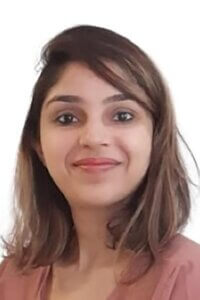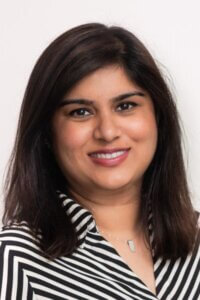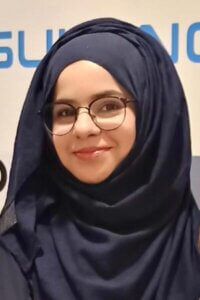Women in Actuarial Science in Pakistan: Part 1
A look at the inspirational career journeys of Zahny Amlany, FSA, CERA; Raazia Haji, FSA, CERA, FCIA; and Manaam Shahid, ASA
November 2024Photo: Shutterstock/fizkes
With an increasing number of young women considering actuarial science as a viable study and career path in Pakistan, The Actuary made an in-depth connection with three women making strides in the actuarial profession in Pakistan.
- Zahny Amlany, FSA, CERA
- Raazia Haji, FSA, CERA, FCIA
- Manaam Shahid, ASA
- Zahny Amlany, FSA, CERA, head of Actuarial Services at EFU Life Assurance: Utilizing her 15-plus years of experience in Pakistan’s insurance industry, Zahny has developed a deep understanding of the complex global financial services landscape. Driven by her commitment to reimagining financial security, she has been instrumental in developing business strategies that address the insurance industry’s evolving needs. Zahny is currently pursuing a global MBA from Bayes Business School (formerly Cass Business School) in the United Kingdom. She is based in Karachi, Pakistan.
- Raazia Haji, FSA, CERA, FCIA, head of Financial Reporting, Reinsurance, Budget, In Force Management and Analytics in the Actuarial and Strategic Planning department at EFU Life Assurance: Raazia is a University of Toronto graduate with more than 15 years of international experience in life insurance and actuarial consulting. She is currently based in Karachi.
- Manaam Shahid, ASA, actuarial manager at SHMA Consulting with nearly six years of experience in consultancy and insurance: She has a BSc in Actuarial Science from the London School of Economics and Political Science (LSE) and is an ASA “on the cusp of becoming an FSA.” Manaam’s expertise is in life and general pricing, risk analysis and financial modeling, with a focus on aligning actuarial insights with business objectives. She is based in Karachi.
Their stories offer a powerful source of motivation for individuals in Pakistan aspiring to enter this challenging yet rewarding profession. Here’s what they had to say about their career journeys.
What inspired you to pursue a career in actuarial science, especially considering this field is not widely recognized for women in Pakistan? How did you come to know the profession, and what attracted you to it?
Zahny: From an early age, I knew I wanted to be at the intersection of mathematics and business and be a strategic decision-maker. Actuarial science offered a unique opportunity to combine my analytical strengths with a broader strategic vision, giving me a spot in the “driver’s seat” of business.
What drew me initially to the profession was its rarity, especially in Pakistan. I saw it as an avenue where I could challenge the status quo and thrive in a career that wasn’t conventional. The fact that actuaries are among the most globally recognized professionals made it even more intriguing. However, when I began researching the role of actuaries, what stood out to me was the power of their work: making financial sense of the future and being instrumental in critical business decisions.
As a young girl, I remember reading the Society of Actuaries (SOA) tagline “Risk is Opportunity” and being immediately drawn to it. What started as a fascination with the profession’s uniqueness has grown into a passion for the impact actuarial work can have—shaping financial ecosystems, driving sustainability and, most importantly, advancing financial and health equity globally. This sense of purpose is what has kept me committed to the profession and continuously striving to break new ground.
Raazia: When I was researching career options during my A-level studies, actuarial science wasn’t a well-known field. My first real exposure came while working in the Bancassurance Operations department at EFU Life. As a recent graduate exploring potential career paths within the life insurance company, I was interested in obtaining a professional designation that offered structured training, growth, financial security, international recognition and mobility.
My direct manager and his manager both had actuarial backgrounds. Actuaries were highly regarded in the company, and I had always enjoyed mathematics in school, so I was intrigued to learn more about this career path. As I researched, I learned that this profession required strong mathematical skills, had a structured path for growth and that actuarial professional bodies in the United Kingdom, Canada and the United States had mutual recognition agreements.
I decided to test the waters by giving the exams a shot. I found the material interesting and was able to clear the first two exams with high scores. I discussed my results and interest in the profession with my manager. He was very supportive and helped me pursue a transfer into the Actuarial and Strategic Planning department. I am grateful for the support I received early in my career, which set the foundation for my actuarial journey.
Manaam: Mathematics has always been my passion. I just get that adrenaline rush whenever I am truly challenged with a mathematical problem, so naturally, I wanted to incorporate that into my career. When I was introduced to actuarial science during my A-levels, it felt like the perfect blend of everything I loved—mathematics, statistics, problem-solving and analysis, all interwoven with finance. I was immediately drawn to it. At that time, I didn’t focus much on whether the field was widely recognized for women in Pakistan. My primary concern was to work hard and excel in a profession I was passionate about, and I’ve been fortunate to find opportunities that supported this journey.
How have societal expectations around gender roles in Pakistan affected your career choices and professional growth? Have you faced any challenges related to these expectations?
Zahny: One of the most significant challenges I’ve faced is being underestimated when entering certain professional environments. Throughout my career, I have often been the only woman, and sometimes the youngest person in the room. While it didn’t take long to demonstrate that I not only belonged but could contribute meaningfully, the reality is that I had to prove myself more frequently than my male counterparts.
Another challenge has been navigating networking opportunities, which often occur in informal settings. In many industries, including mine, career advancement opportunities often come from the connections you build outside of formal environments. As a woman, those informal avenues weren’t always available or appropriate for me, which meant I had to be more strategic in building my network. I focused on professional platforms like LinkedIn, industry conferences and working groups to connect with key players and broaden my professional circle early in my career. These challenges, though frustrating at times, have made me more intentional about my career growth and have pushed me to create my own opportunities.
Raazia: When I was in school and exploring career options, one of the careers I was interested in pursuing was engineering. At the time, I was discouraged from pursuing engineering, as the potential job opportunities in Pakistan were not considered suitable for women. The industrial plants were far from the city, and it was not safe for a girl to travel or live so far from the family home. However, a lot has changed in the last 20 years (although safety is still an issue). More women have entered the job market and the variety of STEM opportunities in the city has increased. I am proud to be a part of this positive change and to see more women pursuing their passions in STEM fields.
Manaam: Like many parents in Pakistan, mine encouraged me to consider a career in medicine, especially since I had a strong background in biology. I felt the same pressure from relatives who frequently urged me to pursue medicine. This external pressure sometimes made me question whether it would be easier to follow the path that would make everyone happy. However, when I voiced my concerns to my parents, the people whose support mattered most, they understood my passion for mathematics and actuarial science and supported my decision to pursue it. I prepared for both paths, applying to medical and actuarial programs, and was fortunate to be accepted into several. When I received a scholarship offer from the London School of Economics for actuarial science, it became clear that this was the right path for me. The journey (thus far) hasn’t been without its challenges, but I’m grateful for the support that helped me navigate societal expectations and follow my passion.
Are there any female role models in the actuarial profession or other fields who have inspired you? How have their journeys influenced yours?
Zahny: Throughout my career, I’ve been fortunate to connect with many exceptionally talented women both within and outside of the actuarial profession. Their dedication and passion have inspired and motivated me. The presence of such role models has reinforced my commitment to leading with integrity and passion.
My greatest role model, however, is my mother. Her example has profoundly shaped my approach to both life and business. She taught me the importance of thoughtful reflection and courageously voicing my opinions, even when they may not be popular. Her knack for recognizing and resonating with the underlying motivations behind people’s actions is a skill I have found to be immensely valuable in my career. Additionally, her resilience in pursuing her goals has inspired me to chase my ambitions with the same resolve and perseverance. Her influence continues to guide me as I navigate my professional journey.
Raazia: I spent 10 years working in Canada and had the good fortune to work in teams where women held multiple managerial and executive roles. Each of them had a unique leadership style, but what inspired me was that they cared about the team, shared their knowledge and celebrated the growth of their team members. It was reassuring and inspiring to see my gender represented in the leadership team. Furthermore, it was promising to see employers that had formal plans to ensure there was a pipeline of female talent for future leadership roles.
I returned to Pakistan two years ago and was surprised at how few women are in actuarial leadership positions. Notably, one of the things that excited me when I joined EFU Life was the strong representation of women in their leadership team.
I am committed to mentoring and supporting young women in the field to help build a stronger pipeline of female leaders. I would like to see more women in leadership positions so young women have role models who inspire them, and I’d like to help build workplaces that will attract and retain more female actuaries.
Manaam: Unfortunately, in our society, women’s career achievements are often overshadowed by traditional roles, which means in my short experience, I didn’t have many female role models in the actuarial profession to look up to. However, this lack of representation has motivated me to work toward becoming a role model myself. I hope to inspire the next generation of girls in the actuarial field by showing them what’s possible and providing the encouragement they need.
That being said, I owe deep gratitude to my female teachers, whose unwavering dedication and support motivated me to excel. These educators are a silent support system in our society, often unappreciated, yet essential. Their resilience in guiding young women to push boundaries, build fulfilling careers and live their best lives has left a lasting impact on me.
How would you describe the professional environment for women in the actuarial field in Pakistan? What changes, if any, are necessary?
Zahny: The actuarial profession generally values competence and skill, regardless of gender. However, challenges remain. I have seen situations where women often find themselves assigned more routine, mundane tasks while men are given opportunities to lead new initiatives and manage key stakeholders. This can create a disparity in advancement opportunities, as men can leverage their broader network and experience to move more easily into leadership roles.
Here are three things that I believe could enhance inclusivity and increase the representation of women in the actuarial field:
- Early engagement and mentorship: We should encourage more women to pursue actuarial careers and support them with effective mentorship from an early stage. It’s important to present actuarial science as an attractive career option for women.
- Proactive recruitment and development: Firms could actively recruit women and ensure they have equal opportunities for leadership and growth, thereby addressing any existing biases in task allocation and career advancement.
- Leadership advocacy and sponsorship: Leadership could actively advocate for gender inclusion and ensure diverse representation at all levels. Women need more sponsors—both men and women—who can champion their careers and support their advancement.
Raazia: Pakistan has a handful of qualified female actuaries, but it has a growing population of female actuarial students. It’s important that we encourage, develop and retain this talent and make the workplace more inclusive for them.
Increasing remote and part-time roles will offer women flexible options and allow them to maintain a work-life balance. Additionally, remote roles will allow us to tap into female talent living in areas outside of the financial hub. Increasing the parental leave offered to both parents will help women balance their responsibilities at home and at work. Offering opportunities to return to work after breaks will increase the long-term retention of women in the field. Ensuring that work and team-building events are held within work hours rather than after hours and on weekends will help women feel fully included and welcome.
We need to survey female actuarial students to understand what specific changes are needed in the workplace. Some workplaces have not updated their infrastructure and practices for the increasing female workforce, so simple things like the ratio of female washrooms to female staff aren’t reasonable. Additionally, sometimes, due to unconscious biases, more technical work is assigned to male colleagues while more administrative tasks are given to female colleagues. All work should be distributed equally so that we have well-rounded male and female actuaries.
Additionally, workplaces need to track the pipeline of female talent available for future leadership positions and have formal plans to increase female representation in leadership.
Manaam: The actuarial field has relatively low representation for women, especially at senior levels. While more women are entering the profession, their numbers diminish in leadership roles due to various societal and professional barriers. The culture in organizations can be male-dominated, which may inadvertently marginalize women. This can manifest in subtle ways, such as exclusion from informal networking opportunities or assumptions about a woman’s ability to balance work and personal life. Additionally, gender biases, both conscious and unconscious, can affect hiring, promotions and performance evaluations. Women may find themselves having to prove their competence more than their male counterparts.
I have been lucky enough to be part of a firm that promotes a positive and comfortable work environment for all women, which I feel is the most important part. We need to create a comfortable workspace for women, introduce mentorship programs, flexible work arrangements and strong, clear policies against discrimination to promote and retain women within the field. We also need to actively work toward gender diversity by targeting for female representation, especially in leadership positions.
What advice would you give to young women in Pakistan who aspire to become actuaries? What challenges should they be prepared for, and how can they best position themselves for success? What three things do aspiring actuaries need to know?
Zahny: My advice to young women aspiring to become actuaries is to know their strengths, trust their worth and be relentless in pursuing their goals. Success in the actuarial field isn’t just about technical skills—it’s also about confidently advocating for yourself. Believe in your abilities and actively seek opportunities that align with your aspirations.
Learn More
For more information, access the SOA’s FAQs on Pakistan.
Additionally, take time to reflect regularly on your work and career path. Ask yourself if you enjoy what you do, what impact your work has and whether any changes are needed. Everyone reflects differently—whether through quiet introspection or conversations with others—what’s important is staying connected to your motivations and goals.
Lastly, don’t wait for opportunities to come to you; speak up for the projects, roles or responsibilities you are interested in, and actively seek them. Build your network, promote your accomplishments and embrace challenges that stretch your abilities and push you outside your comfort zone. Developing your personal brand is also important; it involves consistently showcasing your expertise, achievements and professional growth.
Raazia: The actuarial profession is a gender-neutral profession; women can excel and contribute tremendously. Having a diverse group at the table brings a variety of ideas and approaches, enhancing the decision-making process.
The professional exams are demanding, but you can take breaks and plan them flexibly based on your stage of life and personal needs.
Aspiring actuaries should be prepared for a role that requires problem-solving and strong communication skills. It is important to be able to communicate with both technical and nontechnical audiences.
As women, we need to believe in our strengths. We tend to hold ourselves to a high standard, where if we fall below perfection, we lose confidence and second-guess ourselves. Women should speak up at meetings; their perspectives are so important. Additionally, we need to pursue opportunities we are excited by and not hold back because we don’t have all the requirements or skill sets advertised. We need to advocate for ourselves the way we advocate for others.
Manaam: For young women in Pakistan aspiring to become actuaries, I would tell them to stay focused and determined. Pursue a strong education in mathematics and statistics and start your actuarial exams early. Seek mentors who can guide you and actively network with professionals to open doors to opportunities. Be prepared for challenges like gender bias and balancing work with personal life. Stay confident in your abilities and assert your value. Build both technical and soft skills, especially in communication. Gain practical experience through internships or projects, which will enhance your resume and give you a clearer understanding of the field. Stay updated with industry trends, particularly in predictive analytics and data science, to keep your skills relevant.
Statements of fact and opinions expressed herein are those of the individual authors and are not necessarily those of the Society of Actuaries or the respective authors’ employers.
Copyright © 2024 by the Society of Actuaries, Chicago, Illinois.




